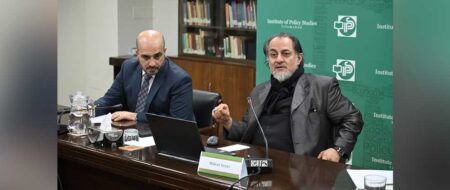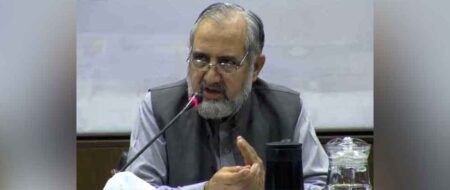Uzbek envoy delivers lecture at IPS
‘Uzbekistan: 25 Years of Independence and Post-Karimov Scenario’
Institute of Policy Studies hosted the Uzbek ambassador to Pakistan H.E. Furqat Sidiqov for a lecture on the eve of the 25th year of independence of Uzbekistan along with the other Central Asian Republics.
The envoy’s lecture, on 29 December 2016, was titled “Uzbekistan: 25 Years of Independence and Post-Karimov Scenario” as a broader theme, however he enlightened the select audience on the evolution of Uzbekistan’s polity, economy and society over past 25 years; the situation arising out of sudden death of the nation’s founding president and the ensuing electoral process, as well as the prospects ahead. He also highlighted Uzbekistan’s foreign policy approaches, especially towards the regional issues and players.
Senior IPS associate and former secretary-general foreign affairs, Ambassador M. Akram Zaki chaired the session.
H.E. Furqat Sidiqov on the occasion said, Pakistan and Uzbekistan have strong historical and cultural links. Looking back at the quarter century long journey of Uzbekistan, he counted many achievements in various fields. He said that after establishing as an independent state in 1991, Uzbekistan started a journey of transition from communism to the market economy. Over the years, it now stands prominently in the region. The country that mainly depended on agriculture and heavy relied on cotton, now has diversified its economy and industry and manufacturing sector now contributes around 45 per cent in its economy. Agriculture sector is highly mechanized and country is already self-sufficient in food and energy. Automobiles, aviation, agriculture, education, healthcare, natural resources.
On demise of former Uzbek President Islam Karimov, various media outlets and political analysts had predicted differences and even disintegration to take grip of the country but the peaceful presidential elections according to the constitution of the country and peaceful transition to the newly elected president Shavkat Mirzayev has proved to the world the strength of political system and civil society in the country. With 88 per cent votes polled in favor of Mirzayev, the nation had actually voted for continuity.

Uzbekistan is determined in following its path of prosperity and progress. While it is opening up to more people and making the country an attraction for traders, industrialists and tourists, it is also working on empowering its citizens. With introduction of e-governance, the citizens can directly lodge complaints and seek information from all departments and organs of the state and institutions and offices are bound to respond to them.
Sharing recent initiatives and further prospects for cooperation with Pakistan he identified agriculture, textile industry, automobiles, railways, aviation and education sectors as possible areas of collaboration. He informed that a direct flight from Lahore to Tashkent is being planned to commence from April 2017, which will reduce the travel time to merely two hours, which currently is around 20 hours through indirect flights. He also said that his country is planning to display its industrial products as well as expertise in agriculture sector through special initiatives. Establishment of Uzbekistan-Pakistan chamber of commerce is also a proposal under consideration.
Terming CPEC as a significant development, he said that his country looked forward to taking benefit of it to reach to sea through Gwadar. To make this work, a railway track through Afghanistan might offer a feasible option. Uzbekistan had already set up a rail track to Mazar Sharif while Pakistan is interested in extending railway line to Kabul. Such an initiative may connect the both countries even through land because connectivity through air offers very limited trade prospects.
 Emphasizing closer links between the two nations, he underlined what connected the two people. Former ambassadors, foreign policy experts, traders and academics present were excited to hear that three Pakistani dramas were being telecast in Uzbekistan and were garnering love for Pakistan and its people. “we need to know each other more”, ambassador reiterated.
Emphasizing closer links between the two nations, he underlined what connected the two people. Former ambassadors, foreign policy experts, traders and academics present were excited to hear that three Pakistani dramas were being telecast in Uzbekistan and were garnering love for Pakistan and its people. “we need to know each other more”, ambassador reiterated.
Ambassador M. Akram Zaki in his concluding remarks said that when Soviet Union showed signs of disintegration soon after its withdrawal from Afghanistan; Pakistan had started exploring the avenues and foundations that would help the country in reviving its historical links with Central Asia. Soon after independence of the Central Asian Republics, Pakistan took proactive initiatives for establishing trade relations.
To guarantee flourishing relations and strong regional economic bonding six Muslim majority states in the Central Asia as well as Afghanistan were invited to join Economic Cooperation Organization and the membership grew from three to ten in one go. The Quetta Plan of Action that was worked out in 1993 between these ten countries presented an ambitious yet practical scheme of connectivity and harmonized mutual economic growth. Developments in Afghanistan kept on hindering these ambitions and denying the immense potential of cooperation at all levels in different areas. Pakistan and Uzbekistan should help Afghans in reaching Stability in Afghanistan, which is imperative for boosting relations among regional countries.
He said that after independence, Uzbekistan has wisely placed itself in international politics and has done well by keeping the US, Russia and China at an arm’s length. It has therefore been able to take decisions in its own national interest with dignity and self-respect.












